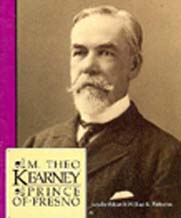THE KEARNEY FOUNDATION OF SOIL SCIENCE
2006-2011 Mission
"Understanding and Managing Soil-Ecosystem Functions
across Spatial and Temporal Scales"
1842-1906
Martin Theodore Kearney, a nineteenth century English immigrant to the United States, was a pioneer land developer who became one of the most powerful and prosperous agricultural leaders in the state of California. Little is known about Kearney's life prior to his arrival in Fresno, California, in 1869; however, it was apparent that he was a man of considerable wealth and financial contacts. By 1871 he had already made several land purchases. Convinced that the arid San Joaquin Valley land, if properly irrigated, had agricultural potential, Kearney asked Professor E.W. Hilgard, head of the Agricultural Department at the University of California, to conduct a feasibility study on the soil. On the basis of Hilgard's favorable report, Kearney succeeded in attracting investors for the creation of a colony farm system of vineyards and orchards in Fresno County. Subsequently, he developed his 5400-acre Fruit Vale Estate exclusively for raisin production, earning him the title, "Raisin King of California". Out of gratitude to E.W. Hilgard and a desire to leave an enduring legacy to California agriculture, Kearney bequeathed the entire estate to the University of California Board of Regents, which in 1951 established the M. Theo Kearney Foundation of Soil Science to support research on soils, plant nutrition, and water science.
For more information please visit the Fresno Historical Society website.
M. Theo Kearney-- Prince of Fresno, by Schyler Rehart and William K. Patterson, is available from the Fresno Historical Society. This biography features photographs from the Society's Kearney Collection as well as a detailed study of the life and works of Martin Theodore Kearney.
